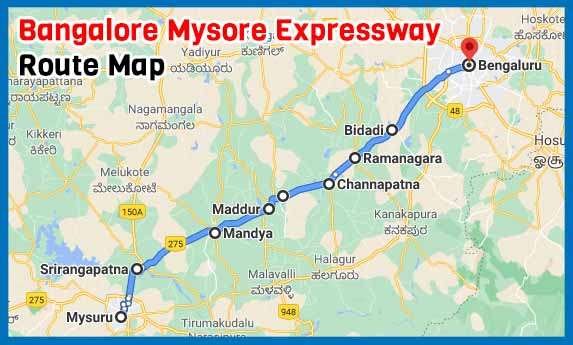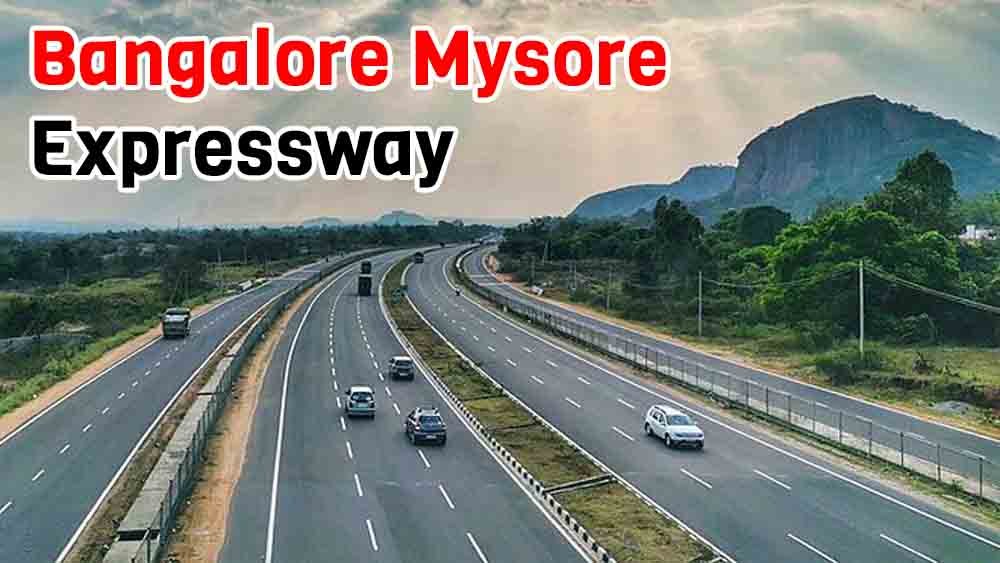Bengaluru and Mysuru are among the state’s most important cities, important for tourism and trade. NH 275, which is four-lane, is still an important highway in the state. However, this route is very congested as it passes through inhabited areas like Mandya, Maddur, and Srirangapatna.
The expressway is a part of the NH 275 highway, and connects Bengaluru and Mysuru, allowing back-and-forth travel between the two cities. It will also connect Bangalore to Kodagu, Mangalore, and Kerala.
The project was proposed to be a brownfield upgrade (60 percent) and greenfield (40 percent) to replace the now-canceled NICE (Nandi Infrastructure Corridor Enterprises) road.
Table of Contents
Bengaluru Mysuru Expressway Overview
- Total Length: 119 km
- Lanes: 10
- Cost: ₹8,066 crores
- Starting Point: Bidadi
- Ending Point: Srirangapatna
- Completion Date: 12 March 2023
About Bengaluru Mysuru Expressway
The Bengaluru-Mysuru Expressway is a 119 km long access-controlled highway in the Indian state of Karnataka. With the completion of the Bengaluru-Mysuru Expressway, it has become easier to travel from Bangalore to Mysore. It takes over three hours to cover the distance from Bangalore to Mysore, sometimes even longer due to traffic. The 10-lane National Highway 275 halves the distance from Bangalore to Mysore.
Bengaluru Mysuru Expressway Route

The Bengaluru Mysuru Expressway stars from Bidadi and will connect Mysore in Srirangapatna. It will cover many localities like Bengaluru, Kengeri, Bidadi, Ramanagara, Channapatna, Maddur, Mandya, Srirangapatna, and Mysore.
A greenfield bypass was built on the Bangalore-Mysore Highway. A 22 km bypass will be built for Ramanagaram and Channapatna, an 8 km bypass for Mandya, a 10 km bypass for Srirangapatna, and a 4 km bypass for Maddur. There will also be a 7 km bypass at Bidadi, allowing people traveling between the two cities to skip all important cities.
69 bus bays, 49 underpasses, 13 overpasses, and access-controlled fencing will be installed on both sides of the six-lane road to ensure free and independent travel.
Bengaluru Mysuru Expressway Construction
The expressway was built in two phases with an investment of approximately Rs 8,066 crore. Towns along the current route will be protected by a 51 km long bypass road, with fences installed on both sides. The project was developed under the Bharatmala Pariyojana (BMP) and was inaugurated in March 2023.
Apart from 4 ROBs (Railway Overbridges), the expressway will have 44 minor bridges, 19 major bridges, and 44 micro bridges. It will also have twenty-five underpasses for drivers and pedestrians.
Phase one: The first phase connects Nidaghatta to Panchamukhi Ganapati temple on NICE Road with Bangalore. Rs 1,600 crore will be spent in the first phase for land acquisition. The road distance in this phase is approximately 56.2 km.
Phase Two: The second phase is from Nidaghatta to Mysore. The second phase has a cost of Rs 1,200 crore for land acquisition, with 61.1 km of roads and an estimated cost of around Rs 3,600 crore.
GPS-Based Toll Collection
The Bengaluru Mysuru Expressway may soon adopt a Geographical Positioning System (GPS) based toll reduction system. In this process, a person will be charged a toll only for the distance he has covered. This system will be implemented as a pilot project on the Delhi-Jaipur Expressway and Bangalore Mysore Expressway. India will launch a GPS-based toll reduction system for the first time. Now one will have to pay toll tax even for a journey of only 10-15 km on the expressway up to Bengaluru.
With the introduction of this system, it has become mandatory to follow Fastag. Geo-fencing will be done to operate a GPS-based system on the expressway. Also, Automatic Number Plate Reader (ANPR) cameras will be installed at the entry and exit points of toll gates.
Bengaluru Mysuru Expressway Latest Update
On March 28, 2024, The National Highway Authority of India revised the toll rates on the Bengaluru Mysuru Expressway every year. Toll rates for car owners traveling on the Bangalore Mysore Access Controlled Expressway have been increased by Rs 10. They will have to pay additional money on top of the existing toll.
Officials said the changed toll rates will be applicable from April 1, 2024. Vehicle owners will have to pay Rs 320 for a one-way journey and Rs 485 for a one-way journey, as per the new toll rates of IRDA.
On March 18, 2024, Prime Minister Narendra Modi’s central government approved the GPS-based toll collection pilot project on the Bangalore Mysore Expressway. The project will start soon. Now the authority will float a tender for this project. Initially, the Expressway Development Authority considered listing the tender projects after the Lok Sabha elections; Now that they have received approval, they can issue tenders quickly. The Ministry of Road Transport and Highways runs the GPS-based toll collection pilot project. The system uses Automatic Number Plate Reader (ANPR) cameras, which enable an automated toll collection system.
Conclusion
The Bengaluru Mysuru Expressway, built along NH 275, will connect the two cities. The expressway benefits travelers, taking one from Bengaluru to Mysuru in just 90 minutes. Furthermore, it will improve connectivity, reduce urban traffic, attract investments, and boost building construction, as well as strengthen the economy of the state and the country.



